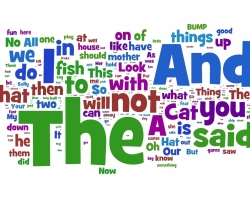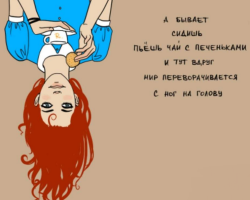Depression in children and adolescents must be recognized as early as possible. This is the only way to help the child so that it is not too late.
Content
- What is depression in children and adolescents of school age?
- Symptoms and signs of somatized depression in children and adolescents - fear, apathy: what should bother?
- Causes of depression in a child: List
- Where to look for help with children's depression, psyche disorders in adolescents?
- Video: Depression in children and adolescents.
In colloquial speech, we often use and, perhaps, even abuse the word “depression”. We say: “I think I'm depressed”, “What a dull weather”, “Do not fall into such depression.” Usually, when we say this, we think about our reaction to some difficult events that caused us sadness, depression, malaise, regret or disappointment.
The use of the term “depression” in everyday life has nothing to do with the actual definition of the word. But this can lead to ignoring the symptoms of real depression. Therefore, it is worth knowing them, as well as the reasons to understand where to look for help. From this article you will learn what depression is, what its symptoms, signs. Read further.
What is depression in children and adolescents of school age?

Often a child who suffers from depression is considered by the environment (parents, school) as lazy, always displeased or sad. Some even unsuccessfully try to motivate children and young people with depression, saying: “Take yourself together”, “Shake”, “Do not exaggerate, nothing happens.”
Only recently experts started talking about children's and teenage depression:
- Previously, this disease was diagnosed only in adults.
- In school -age children, it is invisible, because no one asks them what they feel or in what mood they are.
- Today it is known that children, like adults, are disappointed, a sad loss in their lives.
- If these difficult feelings caused by various situations do not pass, and children have been sad or depressed for a long time (even several months), then they can say that they suffer from depression.
- For ordinary sadness, a pleasant surprise, a gift, time with parents, positive family attention usually helps. In case of depression, this is not enough.
Depression is a disease that can be life -threatening. This is a long, harmful and serious condition with an overly depressed mood and psychological, behavioral and physical symptoms.
Symptoms and signs of somatized depression in children and adolescents - fear, apathy: what should bother?

Symptoms of depression depend on the stage of development of the child. The younger he is, the more difficult it is for him to say what he feels, to share his emotional state with the parent, what he experiences. Children of preschool and primary school age often complain of various somatic complaints. This is somatized depression that needs to be treated. What should bother adults. Read more about this.
Here are the signs and symptoms of somatized depression in children:
- Abdominal pain
- Headache
- Leg pain
- Lack of appetite
- Involuntary wetting
It can also be observed:
- Apathy
- Increased irritability
- Lack of interest in classes, for example, in entertainment that he used to liked
- Unwillingness to cooperate
- Divisive anxiety
- Lack of interest in lessons
Symptoms of teenage depression are slightly different:
- Sadness
- Depression
- Tears
- Easy falling into anger or despair, which can manifest itself by hostility to others
- Indifference
- Apathy
- Loss of ability to experience joy
The young man ceases to enjoy the events or things that he used to rejoice:
- The cessation of activities that previously brought satisfaction, for example, entertainment, hobbies, meetings with friends.
- Young people also refuse to go to school, leave the house, leave the room, neglect personal hygiene.
- Departure from public life.
- An excessive reaction to criticism, irritability or anger, even when the parent attracts attention in a very delicate way and in the trivial issue.
- Depressive thinking, which is expressed by the words “everything is pointless”, “I am hopeless”, “I don’t like me”, “I will fail”, etc.
- An unreasonable sense of fear - "I do not know what I'm afraid of."
- Impulsive, careless actions to facilitate anxiety, tension and sadness, for example, drinking alcohol, drug use.
- Self -destructive actions - causing yourself to be injuries, for example, cutting the body with a sharp tool, burning the body with a lighter or cigarette, bites, scratches to blood, consciously causing pain to itself.
- Thoughts - “life is hopeless”, “for what I live”, “it would be better if I died.”
- Thoughts about suicide are thoughts and fantasies about its own death, its planning and, in extreme cases, suicide.
When working with a young person suffering from depression, we can also observe many nonspecific symptoms, such as:
- Violation of the concentration of attention and difficulties with memorization, which cause difficulties in learning, deterioration of performance, passing lessons.
- Psychomotor excitement - as a result of anxiety and tension, the child makes many senseless movements, for example, gnaws, rubs his hands, etc.
- Engaged in some surpluses, such as watching TV or game.
- Increase or decrease in appetite.
There are also problems with sleep, namely difficulties with falling asleep, awakening at night, waking up early in the morning, excessive drowsiness.
Causes of depression in a child: List

Like any disease, depression in a child also has its own causes. Doctors and psychologists recognize that depression is due to several factors - the list:
Biochemical processes occurring in the brain:
- People suffering from depression suffer from an imbalance between various biochemical substances in the brain.
- Here is their list: serotonin, dopamine, norepinephrine, acetylcholine, histamine and gammaamine -oily acid (GABA).
Predication or genes:
- This means that if grandparents, parents, brothers and sisters suffered from depression, especially in the early stages of development, and the disease was repeated, then the risk of developing such a child is higher than that of his peers.
- However, it should be remembered that this does not mean that such a person will definitely get sick.
Difficult events:
- The difficulties that the child faced, and which he could not cope, and also did not receive any help from adults, cause depression.
- Thus, everything that can negatively affect the functioning of the child and cause a sense of chronic stress, for example, lack of care, lack of support and care from the parents, excessive expectations and requirements that the child is not able to fulfill.
Other difficult events that can contribute to depressive disorders include:
- Harassment, sexual violence.
- Lack of safety.
- A high level of difficult emotions because of the death of the parent, family member, conflicts in the family, parents' illness, child’s own illness.
- Rupture of communication with a loved one.
- Girl, boyfriend, - the loss of friends.
- School problems are low educational results, despite efforts, violence, social isolation from peers.
Psychogenic factors- include an individual psychological design, for example, low self -esteem, self -criticism, and the tendency to automatically interpret the facts and events in their disadvantage.
Where to look for help with children's depression, psyche disorders in adolescents?

Depression is a disease, and it is worth knowing where to seek help. Where to look for help with children's depression, psyche disorders in adolescents?
The main methods of treating depression are:
- Non -pharmacological methods in the form of psychotherapy
- Medical remedies and the inclusion of drugs
Individual, group and family psychotherapy is led by a person who is a certified psychotherapist (and not just a psychologist). Usually this is a psychologist or psychiatrist who has undergone appropriate training for several years and received the title of a psychotherapist.
Pharmacological treatment:
- It should be started, unless the psychological effect has an effect.
- Using drugs is an additional method of psychotherapy.
- The psychiatrist of the child and the teenager solves the issue of using the medicine.
- Comprehensive treatment of depression is usually carried out in a psychiatric clinic.
When a child has an increased tendency to self -destructive behavior and there is a risk of suicide, hospitalization in a psychiatric department for children and adolescents may be required.
Depression is a chronic, recurrent and life -threatening disease. Its treatment lasts a long time, often psychotherapy is enhanced by pharmacotherapy. After the first episode of depression, there is a serious risk of another. Help begins with an understanding and recognition of his disease as a serious illness. Good luck!
Video: Depression in children and adolescents.
Read on the topic:







The main thing is not to blink, while paying attention to the briefing of your child. Figure out what worries and how to help. And for this, the child must trust you and not be shy. We, my husband with our children, bring up our children. We try to solve all issues while, but not a few of them. Be sure to give peace to children to the children to strengthen the nervous system, and he is not so painfully reacting to trouble.